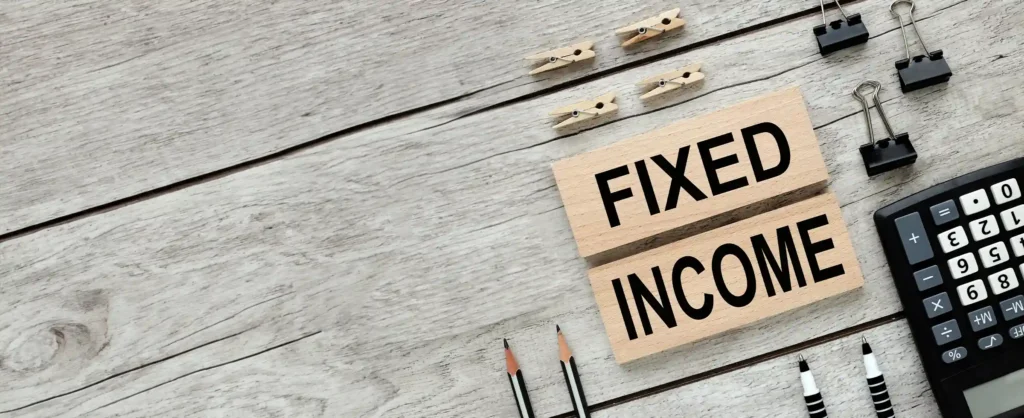With the market becoming increasingly unstable in recent years and high-risk investments coming under heavier scrutiny, many investors are seeking out assets that are resilient to recession, unaffected by interest rate hikes and secure enough to generate passive income in the long term. Fixed-income assets and securities are becoming a popular alternative to more typical options like exchange-traded funds (ETF) for a variety of financial and economic reasons. Interested in expanding your portfolio into an alternative asset that blends the consistency of ISAs with more than a few added benefits? Our breakdown of fixed-income may help you decide the next move in your investment journey.
What is Fixed-Income?
A broad term covering a wide range of asset types, fixed-income refers to investment securities that pay investors a pre-established sum in interest or dividend payments over a set period, typically when the asset reaches its maturity or the contractual length of the investment ends.
According to Investopedia, fixed-income securities and assets distinguish themselves from variable-income securities and assets by ensuring all payments to stakeholders maintain a consistent rate throughout an agreed investment period.
Treasury bonds and bills, corporate bonds and preferred stocks are all considered types of individual fixed-income securities, but prominent firms like BlackRock may offer entire fixed-income portfolio management services and investment strategies.
Last year, fixed-income ETFs listed in the US and Europe attracted a record $235 billion in net inflows, signalling a cautious ‘bear market’ shift towards high-yield, long term assets. The Financial Times speculates that this could be the result of rising global interest rates forcing many to refinance mortgages and liquidate investments to balance their portfolios.
Why Opt for Fixed-Income Investments?
Fixed-income investing can be a sizeable boon to investors seeking to prioritise or introduce certain strategies to their portfolios. Here are three of the most commonly cited advantages.
1. Lower Than Average Risk Factor
Although research by Allianz Global Investors suggests that fixed-income assets can be more exposed to inflationary risks due to their contractually agreed upon and immutable rate of returns, their relative underexposure to other types of common investment risks makes it a highly viable area for risk-averse or risk-conscious investors to branch into.
Because most fixed-income securities are debt obligations, investment holders are often given a priority claim over other asset classes in the event of default. As such, fixed-income investors are more likely to be reimbursed should the company offering the investment opportunity go bankrupt.
2. Can Manage Risk in Your Portfolio
The nature of fixed-income investments and the regularity of payments received by those who hold them make them well-equipped for introducing risk management to existing portfolios. As Schroeders points out, fixed-income securities and assets typically provide entirely different risk and return profiles, and characteristics than other asset classes, meaning that they are less likely to be negatively influenced by the same market forces. With equity risk at a 15-year low for fixed-income bonds and a growing interest in higher-quality/lower-risk market segments, exploring new options could be a panacea for your portfolio the next time interest rates spike.
3. More Stability and Consistency
One of the primary advantages fixed-income has over other investment opportunities and asset types is the level of predictability it offers when it comes to payment and market stability.
While all investments carry a risk factor, some are riskier than others. A stock could plummet in value overnight, causing dizzying losses. And, as recent history has shown, not even market mainstays like residential property are safe from experiencing dramatic dips in viability and profitability for investors.
Fixed-income assets experience far less volatility than many other asset types, with some financial advisers even recommending hybrid fixed-income vehicles as a way for investors of varying experience levels and ages to create sustainable high-yield and capital preservation opportunities in their investment strategy.
Addressing the Risks
Although fixed-income investing is typically considered one of the more stable routes to passive income, there are still some risks investors should be aware of when making their decisions.
The most glaring risk associated with such a passive style of investment is that fixed-income securities and assets rarely reach the heights achieved by riskier options like stocks. This not only makes them less appealing to those seeking short-term victories but also makes them slightly more susceptible to being outpaced by inflation when not properly adjusted. As Forbes suggests, however, these risks can be offset through diversification and securing assets that mature at different dates.
Liquidity is also a common issue when investing in fixed-income securities and assets, as your capital is often tied up and unable to be withdrawn from your investment until the agreed-upon contractual period ends. Still, many of these investment opportunities have options in place to allow for early exits and withdrawals.
If the issuer of the investment opportunity fails to abide by their payment schedule or loses their creditworthiness during your investment, the risk of a credit default can also present itself. For this reason, fixed-income investments are insured or protected in some way to support the safety of your capital.
How Concept Capital Group Reinvents Fixed Income
At Concept Capital Group, we have built an investment opportunity that utilises many of the principles that make fixed-income an increasingly attractive offer to seasoned investors.
As specialists in alternative investment opportunities, our modular homes blend the advantages of traditional property investment with the tenets of fixed-income investing to give our clients a hands-off source of passive income that remains resistant to periods of high mortgage and interest rates. The affordability of our offer compared to traditional housing also allows investors from varying walks of life to use them to diversify their portfolios, while our 360-degree management service means they can enjoy their passive income without having to worry about the day-to-day responsibilities typically associated with property ownership.
To get involved with our property investment opportunity, book a call with our team today.













